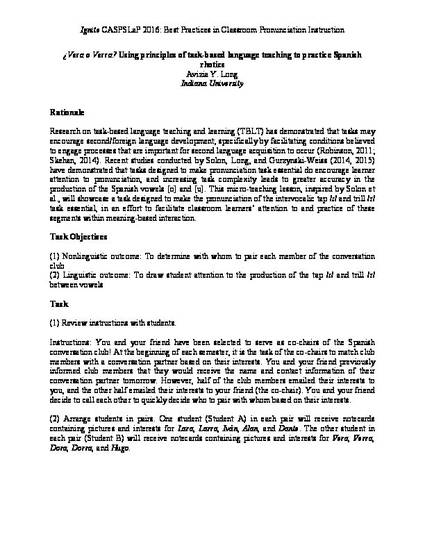
Presentation
¿Vera o Verra? Using principles of task-based language teaching to practice Spanish rhotics
Current Approaches to Spanish and Portuguese Second Language Phonology (CASPSLaP)
(2016)
Abstract
Research on task-based language teaching and learning has demonstrated that tasks may encourage second/foreign language development, specifically by facilitating conditions believed to engage processes that are important for second language acquisition to occur (Robinson, 2011; Skehan, 2014). Recent studies conducted by Solon, Long, and Gurzynski-Weiss (2014, 2015) have demonstrated that tasks designed to make pronunciation task essential do encourage learner attention to pronunciation, and increasing task complexity leads to greater accuracy in the production of the Spanish vowels [o] and [u]. This micro-teaching lesson, inspired by Solon et al., will showcase a task designed to make the pronunciation of the intervocalic tap /ɾ/ and trill /r/ task essential, in an effort to facilitate classroom learners’ attention to and practice of these segments within meaning-based interaction.
Disciplines
Publication Date
April 16, 2016
Location
Columbus, OH
Comments
Presented as part of Ignite: Best Practices and Innovation in Pronunciation Instruction. The materials for this lesson are also available online at this link.
Citation Information
Avizia Y. Long. "¿Vera o Verra? Using principles of task-based language teaching to practice Spanish rhotics" Current Approaches to Spanish and Portuguese Second Language Phonology (CASPSLaP) (2016) Available at: http://works.bepress.com/avizia-long/39/
